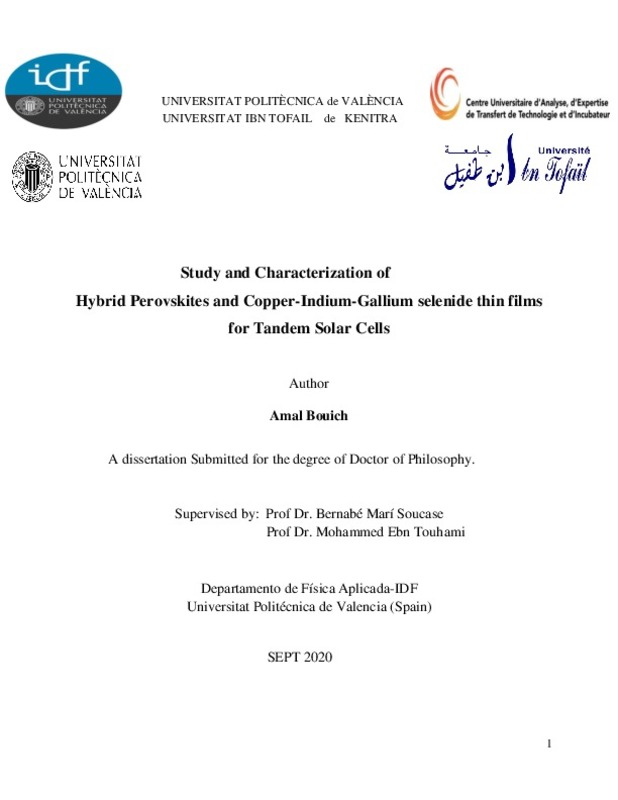|
Resumen:
|
[ES] El objetivo principal de esta tesis es llevar a cabo un análisis comparativo de la configuración predominante de los paneles fotovoltaicos dentro de un sistema establecido orientado al sur, en comparación con varios ...[+]
[ES] El objetivo principal de esta tesis es llevar a cabo un análisis comparativo de la configuración predominante de los paneles fotovoltaicos dentro de un sistema establecido orientado al sur, en comparación con varios escenarios alternativos caracterizados por modificaciones en la orientación y los ángulos de inclinación de los paneles. También se pretende estudiar teóricamente la posibilidad de implantar una cubierta verde en las nuevas instalaciones fotovoltaicas de la zona. Para ello, se emplea un enfoque sistemático que abarca varios pasos fundamentales.
En primer lugar, se realiza una exhaustiva revisión bibliográfica que abarca los principios fundamentales de los sistemas fotovoltaicos. La revisión aclara los fundamentos de la tecnología fotovoltaica y también proporciona una visión cualitativa de los conceptos esenciales relacionados con las cubiertas verdes y vivas, incluidos sus beneficios inherentes, componentes y diversas tipologías. Además, se explora en profundidad la bibliografía existente sobre la aplicación combinada de ambos conceptos. Esta revisión también abarca un examen del impacto de las orientaciones divergentes en los paneles solares, analizando cómo influyen tales alteraciones en la producción de electricidad. La perspectiva sueca también se tiene en cuenta en esta revisión bibliográfica, donde las cambiantes condiciones climáticas, como la nieve durante los meses de invierno, afectan a los sistemas fotovoltaicos.
A continuación, se modela meticulosamente un sistema fotovoltaico existente. Tras la validación, que consiste en garantizar que la instalación modelizada se aproxima al comportamiento del sistema real en términos de generación de electricidad, se introducen modificaciones para explorar el impacto de diversas configuraciones. Esto incluye variar las orientaciones y el ángulo de inclinación de los paneles solares dentro de la configuración existente. Los análisis posteriores aclaran estos efectos, lo que permite la formulación de observaciones concluyentes.
[-]
[EN] The global commitment to renewable energy is steadily intensifying, with a notable surge in the
adoption of photovoltaic solar energy. This growth can be attributed in part to the decreasing
costs of photovoltaic ...[+]
[EN] The global commitment to renewable energy is steadily intensifying, with a notable surge in the
adoption of photovoltaic solar energy. This growth can be attributed in part to the decreasing
costs of photovoltaic systems and the inherent volatility of fossil fuel prices. Furthermore, the
mounting trend of deploying photovoltaic solar energy systems in building rooftops has gained
prominence. This approach capitalizes on otherwise underutilized spaces and contributes to
electricity production. Additionally, research has demonstrated that augmenting conventional
systems with alternatives, such as green roofs and varied solar modules orientations, can yield
additional benefits.
This thesis is dedicated to an exploration of the feasibility of altering the orientation of certain
solar modules within an existing installation, including adjustments in both azimuth and tilt
angles. The selected methodology involves two key phases: initially, studying the characteristics
of the current photovoltaic system to evaluate its efficiency, and subsequently, leveraging the
capabilities of a photovoltaic software. This software facilitates a comprehensive examination of
these possibilities by manipulating various parameters within the model. Thus, the simulated
model was first validated using real annual electricity production data, and then diverse
alternatives were studied to evaluate their impact on electricity production. What is more, it was
also theoretically explored the possibility to implement a green roof in a new photovoltaic
system in the area.
The results showed that, for the specific characteristics of the building under study, a potential
increase of 3.41% in annual electricity production could be achieved by modifying modules
inclined at an angle of 13ᵒ and spaced 1.6 meters to an inclination angle of 35ᵒ and a spacing of
4.8 meters. Furthermore, it was observed that orienting the modules towards the east and/or
west, while yielding a lower peak daily electricity production, provided a more uniform daily
production curve, thereby facilitating higher production levels during the early and/or late hours
of the day. In addition, it was also concluded that combining a green roof with a new photovoltaic
system could increase the annual electricity production, especially during summer months. In
summary, the current photovoltaic system is correctly designed and operates efficiently,
although it can be enhanced to further augment its electricity production.
[-]
|




![[Cerrado]](/themes/UPV/images/candado.png)



